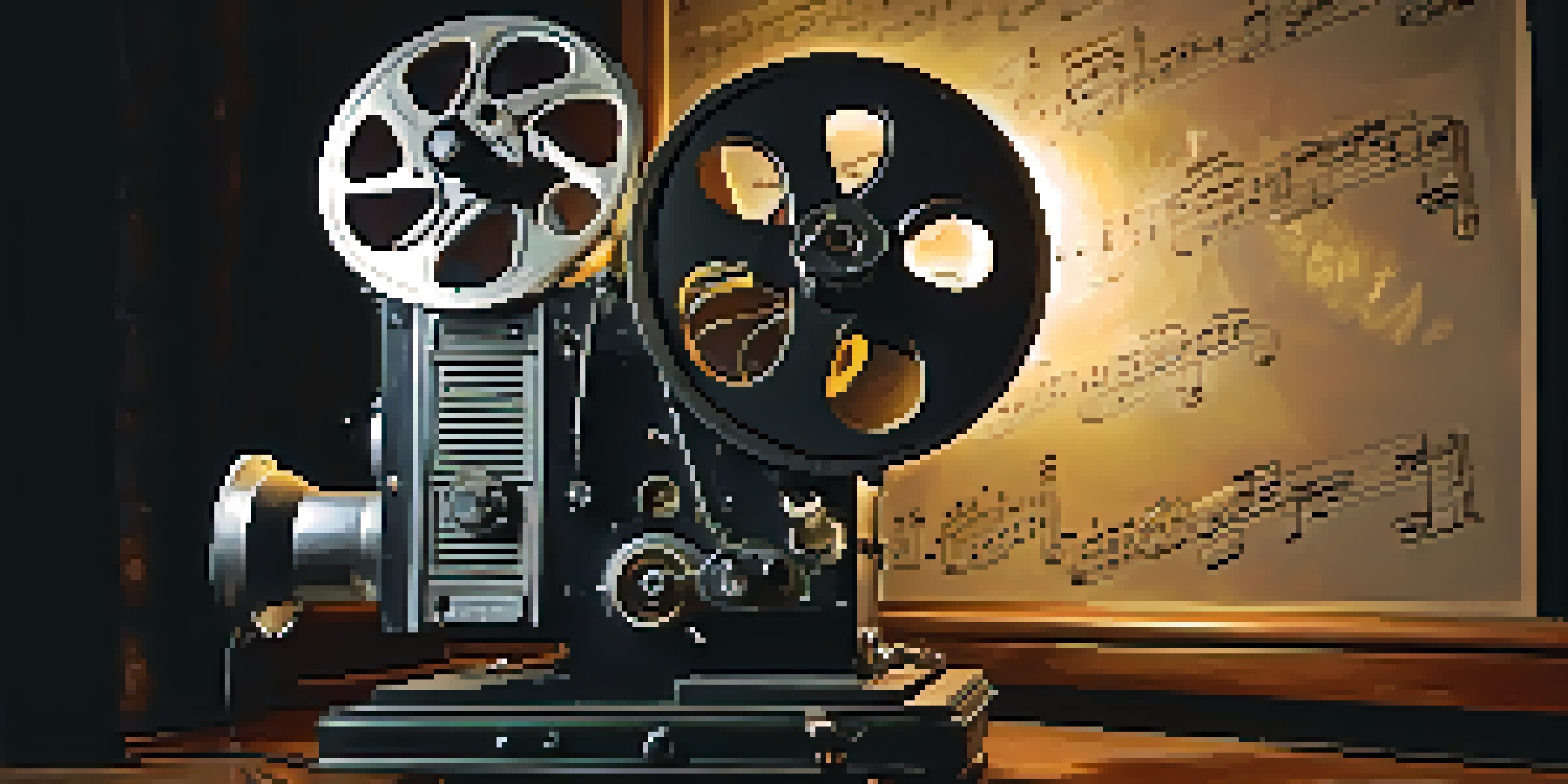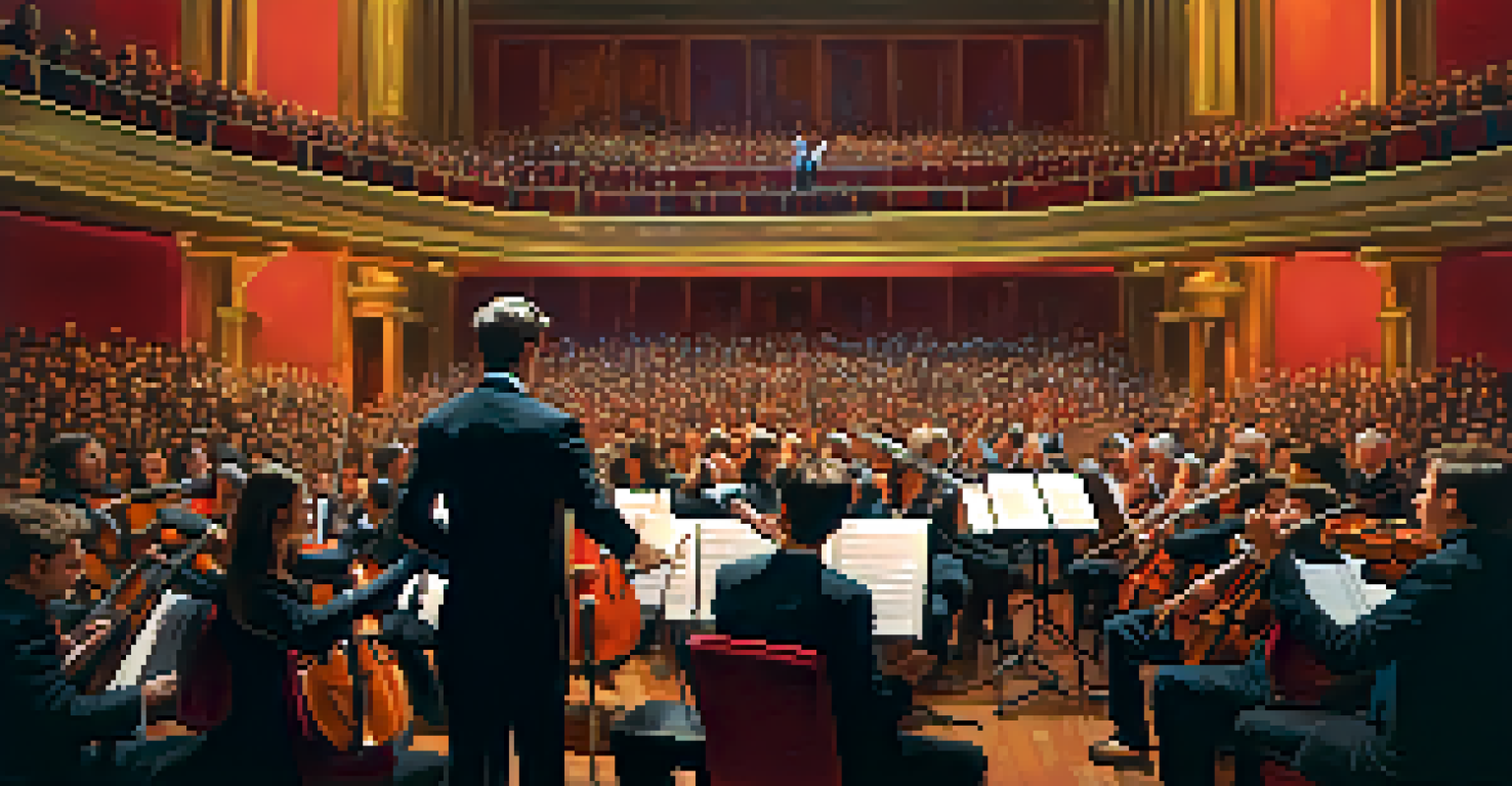Composing Emotion: The Psychology Behind Film Music

The Powerful Role of Music in Film Narratives
Music in film is more than just a background score; it’s a vital element that drives the narrative forward. Think about how a suspenseful score can make your heart race during a thrilling scene. The right music can evoke specific emotions, guiding the viewer's feelings and reactions as the story unfolds.
Music can change the world because it can change people.
For instance, consider the iconic score of 'Jaws.' The simple two-note theme instantly creates tension and fear, signaling danger before the audience even sees the shark. This illustrates how composers use music to prepare the audience emotionally for what lies ahead in the story.
Ultimately, film music serves as an emotional roadmap, helping audiences navigate their feelings and deepen their connection to the characters and plot.
The Psychology of Sound: How Emotions Are Evoked
At its core, the psychology of sound explores how different musical elements elicit emotional responses. For example, major chords often convey happiness or triumph, while minor chords can evoke sadness or tension. This emotional language of music taps into our subconscious, making us feel something even before we understand why.

Research suggests that our brains respond to music in a way that can trigger the release of hormones such as dopamine, which we associate with pleasure and reward. This connection explains why we might tear up during a sad scene or feel exhilarated during an action sequence, even if the visuals alone wouldn’t have the same impact.
Cultural Influence on Soundtracks
Film music reflects societal emotions and cultural contexts, enriching the viewing experience.
By skillfully manipulating these musical elements, composers can create a rich emotional landscape that resonates with viewers on a personal level.
Themes and Motifs: Musical Signatures in Film
Themes and motifs are recurring musical ideas that represent characters, emotions, or concepts within a film. Think of John Williams’ 'Imperial March' from 'Star Wars.' This piece is not just a catchy tune; it embodies the essence of the character Darth Vader, signaling his presence and the darkness he represents.
The only truth is music.
These musical signatures help to build familiarity and emotional depth. When audiences hear a particular motif, it can trigger memories and feelings associated with that character or theme, enhancing the storytelling experience.
In this way, composers craft a sonic identity for their films, allowing viewers to connect on a deeper level with the narrative and its emotional arcs.
Cultural Context: How Music Reflects Societal Emotions
Film music doesn’t exist in a vacuum; it’s often influenced by cultural norms and societal emotions. For instance, the music in a film set in the 1980s may incorporate synthesizers that evoke feelings of nostalgia and a sense of time. This connection to cultural context helps to engage viewers and makes the story feel relevant.
Moreover, composers often draw upon traditional musical styles to elicit specific emotions tied to cultural experiences. A film set in Japan may use traditional Japanese instruments, evoking a sense of place and cultural identity.
Music Drives Film Narratives
Film music is essential for guiding emotions and enhancing storytelling.
By weaving these cultural elements into the score, filmmakers can create a more immersive experience, allowing audiences to feel more connected to the story and its characters.
The Craft of Composition: Techniques Used by Film Composers
Film composers employ a variety of techniques to craft scores that resonate emotionally with audiences. Techniques such as layering, orchestration, and dynamics play a crucial role in shaping how music impacts a scene. For example, a sudden crescendo can heighten tension, while a gentle lull can evoke calmness or introspection.
Composers also use silence strategically, allowing for moments of reflection and giving the audience space to absorb the unfolding drama. This balance between sound and silence is key to creating a compelling emotional narrative.
Ultimately, the craft of composition is about more than just notes—it's about creating an auditory experience that echoes the film's emotional journey.
Audience Response: How Viewers Connect with Film Music
The way audiences respond to film music can vary widely, influenced by personal experiences and cultural backgrounds. A score might trigger memories for one viewer while leaving another indifferent. This diverse range of responses is what makes film music so fascinating and complex.
Studies show that music can enhance memory recall, often helping audiences remember key moments from a film long after they've seen it. This connection between music and memory is why certain scores become iconic, staying with us well beyond the credits.
Audience Engagement with Scores
Viewers connect deeply with film music, enhancing their emotional engagement and memory of the film.
As audiences connect emotionally with the music, they become more engaged with the film, transforming a simple viewing experience into a memorable journey.
The Future of Film Music: Trends and Innovations
As technology evolves, so does the landscape of film music. Composers are now experimenting with new techniques, such as integrating electronic sounds with traditional orchestration to create fresh and innovative scores. This fusion often reflects contemporary themes and the emotional complexity of modern storytelling.
Additionally, the rise of streaming platforms has changed how film music is consumed and appreciated. With more accessibility, audiences can explore soundtracks beyond the film, leading to a broader appreciation of the art form.

Looking ahead, the future of film music promises to be exciting, with endless possibilities for creativity and emotional expression that will continue to shape the cinematic experience.